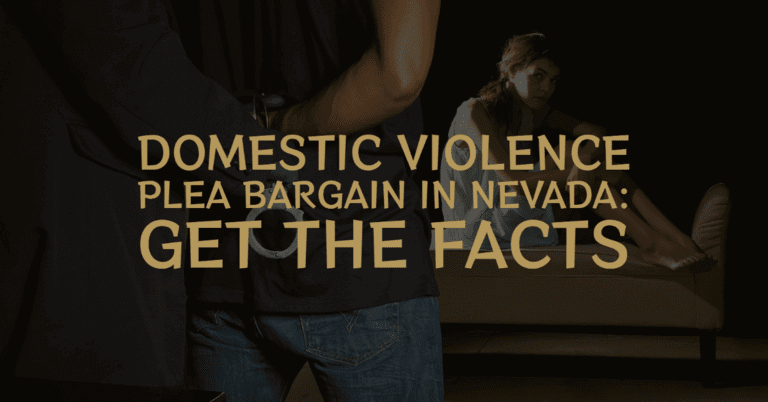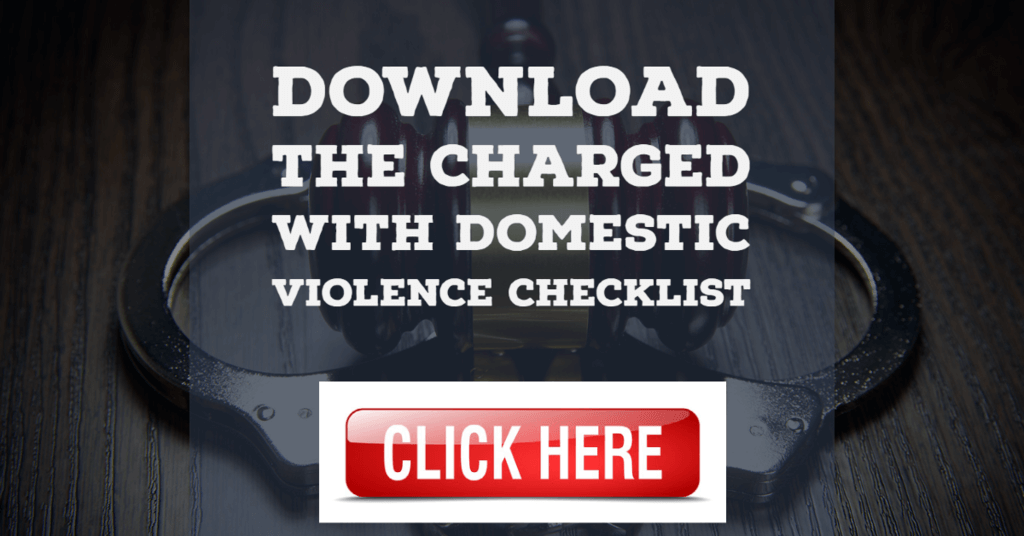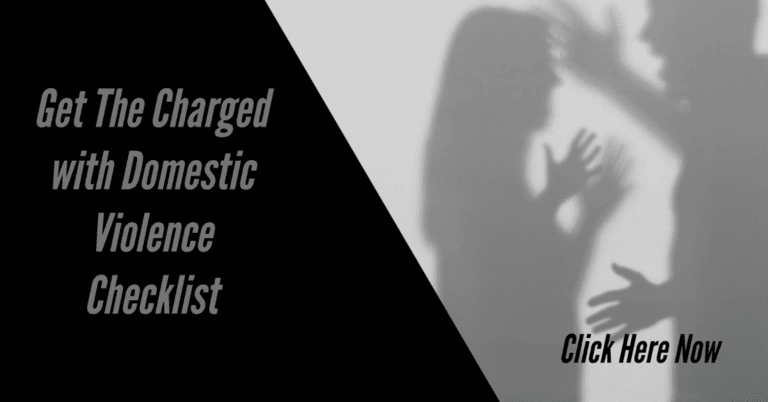Everyone should know the facts about domestic violence plea bargains in Nevada. In this post, you’ll learn what you need to know about the process and your rights.

Benefits to Accepting an Offer
A plea bargain can result in a shorter sentence besides reduced charges. You can avoid a longer prison sentence. You may also be able to receive probation or community service instead.
Going to trial involves more risk, as there are no guarantees of acquittal. Accepting a plea bargain gives you more certainty about your case’s outcome. You can also avoid the trial’s stress and uncertainty.
Trials can be expensive. Accepting a plea bargain can save you the cost of a trial and related legal fees. A plea bargain can also help you avoid the potential costs of a civil lawsuit if the victim decides to pursue one.
Accepting a plea bargain can bring closure to your case. You can move on. You can avoid a prolonged legal process.
Accepting a plea bargain depends on the specific facts of your case. There are no guarantees. Discuss potential benefits and drawbacks with your attorney before making any decisions.
Talk to Your Attorney About the Options
Before accepting a plea bargain, discuss the terms with your attorney. Make sure you fully understand what you are agreeing to.
An experienced attorney can provide legal expertise. The attorney can guide you on the potential effects of accepting a plea deal.
Your attorney can explain the terms of the deal.
The attorney will go over the strength of the prosecution’s case. The attorney can explain whether the plea deal is in your best interest.
A skilled attorney can also try to negotiate a better plea deal. They can talk to the prosecutor about a lesser charge. The domestic violence defense lawyer can also ask for a reduced sentence, or other favorable terms.
A solid Las Vegas criminal defense lawyer can explain what happens if you take a plea deal. This can include talking about the impact on your criminal record. A lawyer can explain how accepting a deal might affect employment prospects. The lawyer can also tell you what might happen at future legal proceedings if you take the deal.
Overall, having an attorney will make sure your rights are protected. They can make sure that any plea deal is voluntary. The lawyer will make sure you are not being forced into accepting the terms.
Your attorney can take into account your personal circumstances. The lawyer will consider your goals and help you make informed decisions.

If You Accept a Deal, You Waive Your Right to a Trial
A plea deal is an agreement between the defendant and the prosecutor. The defendant agrees to a guilty plea or no contest to one or more charges. The prosecutor agrees to certain things too. This can include reduced charges, a shorter sentence, or a complete dismissal.
If you accept the deal, the judge will sentence you. Usually, the judge will follow terms of the plea agreement. You do not present evidence or cross-examine witnesses. You also cannot argue the case at trial.
It is important to carefully consider your options. Talk to your attorney before you decide to accept a plea deal or go to trial. Plea deals may offer certain benefits. However, it could involve waiving the right to a trial and admitting guilt. This can have long-term consequences.
A Conviction for Domestic Violence May Forfeit Your Firearm Rights
The court will issue an order that you cannot own or have firearms. Sometimes, this order can last for a certain period of time or forever. It just depends on the facts of the case.
You may still lose your firearm rights if you are subject to a protective order. It is important to speak with your attorney about the potential effects of a plea deal. This can have a serious impact on your firearm rights.
If you get caught with a firearm. it can result in additional criminal charges and penalties. If you have any questions or concerns about your firearm rights, you should consult with an experienced attorney.
You DO NOT Have to Accept a Plea Bargain in Your Case
You can reject a plea bargain in your domestic violence case.
A plea bargain is a voluntary agreement between you and the prosecution. You have the right to accept or reject it.
If you reject a plea bargain, your case will proceed to trial. At trial, the prosecution will present evidence to try to prove the domestic violence charges against you. They must prove the case beyond a reasonable doubt.
You and your attorney will have the chance to also present evidence. You can call witnesses and testify. Your lawyer can argue your case. Your attorney may be able to prevent a domestic violence conviction from going on your record.
Then, the judge or jury will decide whether you are guilty or not guilty.
Rejecting a plea bargain can be a risky decision. There is no guarantee of acquittal at trial.
If you are found guilty, you may face more severe penalties. Also, the trial process can be time-consuming. Trials are stressful and expensive.
It is important to carefully consider your options. Consult with your attorney before deciding whether to accept a plea bargain. Your attorney can provide legal advice. They will help you weigh the potential risks and benefits of each option.
Taking a plea bargain in a battery domestic violence case in Nevada is a serious decision. It should not be taken lightly. Each case is unique.
The specific facts of your case will help you decide to accept or reject a plea bargain. Hiring an experienced attorney can help. They will make sure you can make an informed decision. They will protect your rights.
An experienced attorney will ensure the best possible outcome for your case.

Frequently Asked Questions
What is a domestic violence plea bargain in Nevada?
A domestic violence plea bargain is an agreement between the defendant and the prosecutor in a domestic violence case. The defendant pleads guilty or no contest to one or more charges, and in return, the prosecutor agrees to certain conditions, like reduced charges, a shorter sentence, or a complete dismissal of the case.
What are the benefits of accepting a plea bargain?
Accepting a plea bargain can result in a shorter sentence or reduced charges. It can also provide more certainty about your case’s outcome and help you avoid a trial’s stress, cost, and uncertainty. However, discussing the potential benefits and drawbacks with your attorney before deciding is essential.
Do I have to accept a plea bargain?
No, accepting a plea bargain is entirely voluntary. You have the right to accept or reject any plea deal. If you refuse a plea bargain, your case will proceed to trial.
What happens if I accept a plea bargain?
If you accept a plea bargain, you waive your right to a trial and admit guilt to the charges specified in the deal. The judge will then sentence you, typically following the plea agreement’s terms.
How does a conviction for domestic violence affect my firearm rights in Nevada?
A conviction for domestic violence may result in the forfeiture of your firearm rights. Depending on the case’s specifics, the court may issue an order prohibiting you from owning or possessing firearms for a certain period or indefinitely.
How can a lawyer help me in the plea bargaining process?
An attorney can provide legal advice, explain the terms of a plea deal and its potential effects, and negotiate better terms with the prosecutor. They can assess the strength of the prosecution’s case and help you determine if accepting the deal is in your best interest. They can also explain the possible impacts of a plea deal on your criminal record, employment prospects, and future legal proceedings.
What happens if I reject a plea bargain?
If you reject a plea bargain, your case will proceed to trial. At trial, the prosecution will present evidence to prove the domestic violence charges against you beyond a reasonable doubt. Along with your attorney, you can present evidence, call witnesses, and argue your case. However, going to trial carries risks, including the potential for more severe penalties if you’re found guilty.
What factors should I consider when deciding whether to accept a plea bargain?
You should consider the strength of the prosecution’s case, the potential consequences of a conviction, the terms of the plea deal, and your circumstances and goals. Discussing these factors with a knowledgeable attorney can help you make an informed decision.

Glossary
Domestic Violence: A pattern of behaviors one partner uses to maintain power and control over another partner in an intimate relationship. This can include physical, sexual, emotional, economic, or psychological actions or threats.
Plea Bargain: An agreement in a criminal case between the prosecutor and defendant. The defendant agrees to plead guilty or no contest (nolo contendere) to a particular charge in return for some concession from the prosecutor.
Defendant: The person accused of a crime in a legal proceeding.
Prosecutor: The legal party responsible for presenting the case against an individual suspected of breaking the law in a criminal trial.
Conviction: A formal declaration that someone is guilty of a criminal offense, made by a jury’s verdict or a judge’s decision in a court of law.
Sentence: The punishment assigned to a defendant found guilty by a court or fixed by law for a particular offense.
Trial: A formal examination of evidence before a judge, and typically before a jury, to decide guilt in a case of criminal or civil proceedings.
Acquittal: The judgment that a person is not guilty of the crime with which the person has been charged.
Firearm Rights: The legal rights of an individual to purchase, possess, or carry a firearm, subject to the different laws of each state.
Protective Order: A court order directing one person (the respondent) not to do certain things, such as contact or abuse the petitioner (the victim).
Legal Fees: Costs incurred with legal services provided by a lawyer or law firm.
Civil Lawsuit: A legal dispute between two or more parties that seek monetary damages or specific performance rather than criminal sanctions.
Defense Attorney: The lawyer representing the defendant in a lawsuit or criminal prosecution.
Guilty Plea: A formal admission by the accused party in the court of law that they committed the offense they are charged with.
No Contest Plea (nolo contendere): A plea by which a defendant in a criminal prosecution accepts conviction as though a guilty plea had been entered but does not admit guilt.
Probation: A period of supervision over an offender, ordered by the court instead of serving time in prison.
Community Service: Unpaid work intended to be of social use that an offender must do instead of going to prison.

More Resources for You
It’s important for our readers to know that our lead attorney, Molly Rosenblum Allen, Esq., has created a range of resources to assist those facing domestic violence issues. These resources offer valuable guidance and legal insights for various situations:
Domestic Violence Lawyer Las Vegas: This resource provides expert legal assistance for anyone seeking a domestic violence lawyer in Las Vegas. More information can be found at Rosenblum Law’s Domestic Violence Lawyer Las Vegas page.
Domestic Violence Las Vegas: Offering detailed information and support for domestic violence cases in Las Vegas, this resource is essential for understanding local legal nuances. Learn more at Rosenblum Law’s Domestic Violence Las Vegas page.
How to Get Domestic Violence Charges Dismissed: A valuable resource for those looking to understand how domestic violence charges might be dismissed. Further information is available at Rosenblum Law’s page on getting domestic violence charges dismissed.
How to Get Your Gun Rights Back After a Domestic Violence: This resource is particularly useful for individuals seeking to restore their gun rights following a domestic violence incident. More information can be found at Rosenblum Law’s page on getting gun rights back after domestic violence.
What are the Chances of Beating a Domestic Violence Charge in Nevada?: This resource provides insight into the likelihood of successfully defending against a domestic violence charge in Nevada. Learn more at Rosenblum Law’s page on beating a domestic violence charge in Nevada.
Should I Request a Jury Trial for my Domestic Violence Case?: For those uncertain about the best course of action in a trial, this guide offers perspective on whether to request a jury trial in domestic violence cases. Further details can be found at Rosenblum Law’s page on requesting a jury trial for a domestic violence case.
Each of these resources has been crafted to provide specific, practical advice for those dealing with domestic violence issues, reflecting Molly Rosenblum Allen, Esq.’s commitment to helping those in need.

Offsite Resources You May Find Helpful
Nevada Coalition to End Domestic and Sexual Violence: This organization provides resources, help lines, and legal aid information for victims of domestic violence in Nevada.
American Bar Association – Plea Bargain Pros and Cons: This article discusses the pros and cons of plea bargaining, which can be particularly relevant for those facing domestic violence charges.
The National Domestic Violence Hotline: This is a national resource that provides support, resources, and advice for victims of domestic violence. They also have a section on legal help.
Why You Still Haven't Hired a Las Vegas Domestic Violence Defense Attorney Yet
Watch this short video to take the next big step toward defending your rights against your domestic violence charge.

A Special Message from Our Lead Attorney

Molly Rosenblum, Esq.
Dear Reader,
Thank you for reading the resources I’ve put together on the Rosenblum Allen Law Firm website. I aim to provide you with valuable insights into the complexities of our legal system, and I hope you found them helpful.
Each case is unique, and discussing your situation with a qualified attorney is essential. I invite you to schedule a free consultation with our team to discuss your case further and understand your legal options.
Please feel free to call us at (702) 433-2889. Our experienced legal team is ready to assist you through this challenging time. Remember, you don’t have to face this alone. We’re here to help.
Best Regards,
Molly Rosenblum, Esq.




